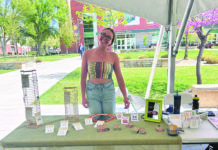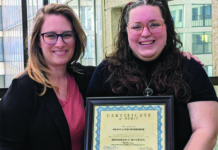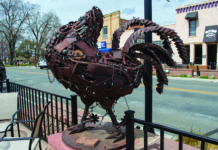by Lauren Heaton
Dr. Steve Werman is a reptile expert that has been working at CMU since 1989. After earning a Bachelor of Science in zoology and a Master of Science in biology at California State University at Long Beach, Werman wanted to work for fish and wildlife in California.
As luck would have it, there was a hiring freeze and even those with master’s degrees were not getting hired. Consequently, Werman chose to pursue a doctorate in tropical biology at the University of Southern California, and a year into his doctorate his advisor moved to the University of Miami. Werman and the rest of his doctorate peers followed to finish out their schooling.
This cross country move was beneficial for him as he was preparing his doctoral dissertation on pit viper snakes in Central America and South America and how they are all related.
“It ends up, Miami is a lot closer to Costa Rica than southern California, so airfares were cheaper,” Werman said. “You get down there quicker, you know it was just a better place to be.”
He then did a three-year postdoctoral research at the California Technical University in Pasadena, Calif., in molecular genetics.
Werman has since then published his research on Phylogeny and the evolution of ß-neurotoxic phospholipases A2 (PLA2) in the venoms of rattlesnakes, pit vipers and related genera of the neotropics and nucleic acids and DNA hybridization, just to name a few.
Werman is currently interested in publishing his research on venom proteins in rattlesnakes, specifically their neurotoxin.
“I’ll probably make the trip down to Costa Rica here soon,” Werman said.
He is also hopeful that his book that is in the works will be published early spring 2017.
What brought you to Grand Junction?
“I was sitting in my lab at Cal Tech looking at ‘Science [magazine],’ you know, that’s where all the jobs are, and there was a job for Mesa State College, Biology Professor. So I applied, got interviewed, got the job,” Werman said.
He has spent time working in a variety of roles here at CMU for the past 27 years including time as a professor, department head and assistant vice president of academic affairs.
Do you miss any aspects of the old campus?
“It was a lot smaller campus, so you kind of knew a lot of the students better, the classes were smaller. […] Back then I knew all the biology majors, all the students. So that’s the only thing I miss,” Werman said.
“Other than that I think the facilities are better. […] The science building is pretty amazing, the laboratory building, the classrooms are better. We didn’t have any technology when I started. We had colored chalk in lectures. […] I would just come back to my office covered in chalk, that I don’t miss.”
What is your favorite class to teach here?
“All of them,” Werman said.
But his all-time favorite course is developmental biology, which he has been teaching since he was at the University of Miami in 1984 as a doctoral student. When thinking back to interviewing for CMU with the head of the department at the time, Werman was told that he would be teaching multiple courses. This was a huge draw for him.
“Here I got to teach a whole swath of classes and that has been the most rewarding thing here,” Werman said.
What are some of your hobbies?
“I am waiting for the snow ‘cause I snowboard. Hiking, I’m into hiking because I am always out looking for reptiles and snakes. […] I like fishing. And to be honest I spend a lot of time reading too.”
Werman is interested in old biology, zoology and medical books from the 1800 and 1900s and has a collection. He is passionate about studying the differences in how scientists now approach research with all the technology as compared to back then.
“It’s almost like a different world back then, when it comes to biology,” Werman said.
He also hopes to start a milestone course at CMU to tie together art history and biology.
“There is this amazing body of art out there related to biology from DaVinci’s time forward. […] Sometimes the scientists did it themselves, they did their own drawings.”
Any other thoughts?
“I just think that part of it is I’ve spent kind of my whole career here. The faculty, the campus and the students have really grown in a positive way. […] For some reason everything works here. We started off really small, but we got some visionary people, like Tim Foster. He grew the campus in a big way and it has benefited everybody,” Werman said.
“This is kind of a secret, in other words, it’s a garden spot I think that attracts a lot of people and we’ve used that to our advantage.”
“The students here are really good, they work hard, they’re serious. They’re just better.”
He mentioned that the students at CMU are a large part of why he has stayed at CMU.
“They’re interested in learning, not just grades,” Werman said.
“If I had to do it all over again I’d still work here, I wouldn’t go anywhere else.”





